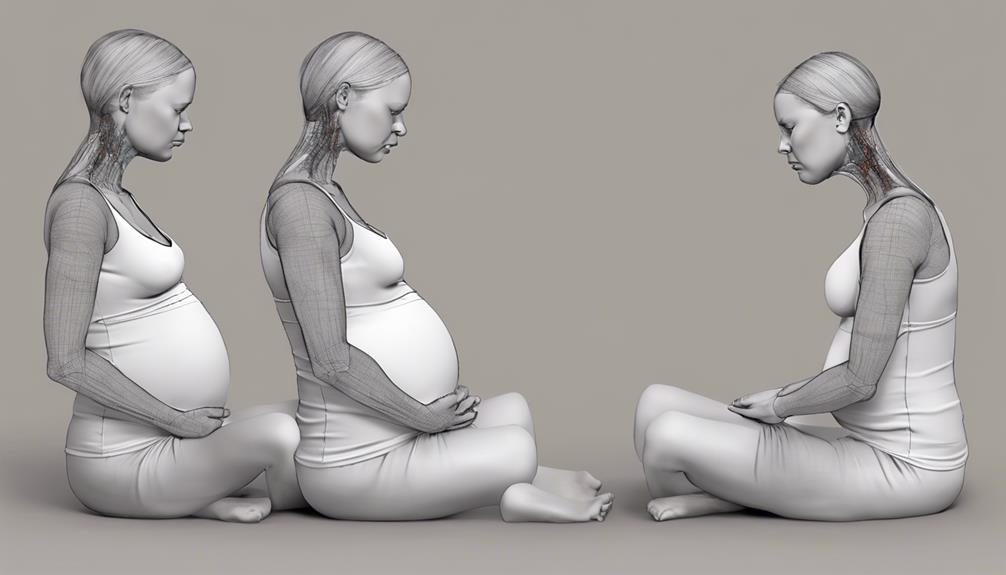Let’s explore the seven causes of headaches during the second trimester. Understanding these triggers can provide valuable insights in relieving discomfort during this crucial period.
From hormonal fluctuations to changes in posture, each trigger plays a significant role in the headache puzzle.
But what about the lesser-known culprits that might be lurking in the shadows, waiting to disrupt your peace?
Stay tuned to uncover the full spectrum of triggers that could be impacting your well-being during this critical time.
Key Takeaways
- Stay hydrated with 8-10 glasses of water daily to prevent dehydration headaches.
- Understand hormonal changes and their impact on headache frequency and intensity.
- Manage stress, prioritize sleep, and maintain proper posture to reduce headaches.
- Address sinus issues and allergies effectively to prevent associated headaches.
Hormonal Changes
Hormonal changes during the second trimester greatly impact the frequency and intensity of headaches experienced by pregnant individuals. As estrogen levels surge to their peak during this period, it can lead to shifts in headache patterns, potentially triggering migraines or tension headaches. Additionally, the rise in progesterone, which typically induces muscle relaxation, may paradoxically contribute to headaches in the second trimester. These fluctuations in estrogen and progesterone play a significant role in the onset and severity of headaches during pregnancy.
Understanding how these hormonal changes influence headaches is important for developing effective management strategies tailored to pregnant individuals. By recognizing the interplay between estrogen, progesterone, and headache symptoms, pregnant individuals can better address and alleviate the discomfort associated with headaches during the second trimester. It's important to approach these headaches with a thorough understanding of the hormonal dynamics at play to guarantee a smoother pregnancy experience.
Dehydration

Staying hydrated is important during the second trimester to avoid triggering headaches.
Signs of dehydration, like dark urine and fatigue, shouldn't be ignored.
We need to make sure we drink enough water throughout the day to prevent headaches and maintain our well-being.
Hydration Importance
Proper hydration is essential during the second trimester of pregnancy to prevent dehydration-related headaches and promote overall well-being for expectant mothers. Dehydration can exacerbate headaches and impact your health, making it important to stay adequately hydrated.
Here are three key points to help you understand the importance of hydration during this stage:
- Aim for 8-10 Glasses: Pregnant women should aim to drink at least 8-10 glasses of water daily to maintain proper hydration levels and prevent dehydration.
- Symptoms to Watch: Keep an eye out for signs of dehydration such as dizziness and fatigue, as these can worsen headache symptoms.
- Good Health: Proper hydration not only reduces the risk of headaches but also supports your overall health during the second trimester.
Symptoms to Watch
Ensuring adequate hydration is essential to monitor for symptoms of dehydration during the second trimester of pregnancy. Dehydration can exacerbate headaches and affect overall well-being. Symptoms to watch for include dark urine, dry mouth, dizziness, and fatigue. Monitoring hydration levels is vital to managing these symptoms and promoting peak health during this stage. It's recommended that pregnant individuals drink at least 8-10 glasses of water daily to prevent dehydration. By staying mindful of these signs and maintaining sufficient fluid intake, one can help reduce the likelihood of experiencing headaches and support their well-being throughout the second trimester.
| Dehydration Symptoms | Description | Action Needed |
|---|---|---|
| Dark Urine | Sign of dehydration | Increase water intake |
| Dry Mouth | Lack of hydration | Sip water frequently |
| Dizziness | Dehydration warning | Rest and hydrate |
Prevention Tips
To prevent dehydration-related headaches during the second trimester of pregnancy, it's important to maintain ideal hydration levels by consistently drinking enough water throughout the day. Dehydration can be a significant trigger for headaches during this time, so ensuring adequate intake is essential. Here are three practical tips to help you stay hydrated and prevent headaches:
- Carry a reusable water bottle with you wherever you go as a reminder to drink water regularly.
- Set specific goals for water intake throughout the day to track your progress and make sure you're meeting your hydration needs.
- Flavor your water with slices of fruits like lemon or cucumber to make it more enjoyable and encourage increased consumption.
Stress and Anxiety

Experiencing stress and anxiety can commonly trigger headaches during the second trimester of pregnancy. Hormonal fluctuations and emotional changes can contribute to increased stress levels, making pregnant individuals more susceptible to headaches. It is essential to manage stress through various relaxation techniques such as deep breathing, mindfulness, or meditation, which can effectively alleviate headaches. Seeking support from loved ones or a healthcare provider is pivotal in coping with stress and reducing the frequency of headaches. Prioritizing self-care and taking breaks when needed can also be beneficial in managing stress-related headaches during this pivotal stage of pregnancy. Here is a table summarizing key points to help you navigate stress and anxiety triggers:
| Effective Strategies | Benefits |
|---|---|
| Deep breathing exercises | Calms the mind and reduces headache intensity |
| Mindfulness or meditation practices | Promotes relaxation and eases stress levels |
| Seeking support from loved ones | Provides emotional backing and comfort |
Lack of Sleep

Handling the challenges of the second trimester, particularly with stress and anxiety potentially triggering headaches, can be further complicated by the impact of inadequate sleep on pregnant individuals. During this critical period, the lack of proper rest can greatly increase the likelihood of experiencing headaches, both tension headaches and exacerbation of migraine symptoms.
- Hormonal Changes: The hormonal fluctuations characteristic of the second trimester may disrupt sleep patterns, making it harder for pregnant individuals to get the rest they need. These changes can contribute to the development of headaches and escalate existing migraine symptoms.
- Physical Discomfort: The physical discomfort associated with pregnancy, coupled with high blood pressure concerns, can make it challenging to find a comfortable sleeping position. This discomfort can lead to fragmented sleep, increasing the risk of headaches.
- Importance of Adequate Sleep: Ensuring sufficient rest is vital for overall health during pregnancy. Establishing a bedtime routine and creating a cozy sleep environment can support better rest, potentially reducing the frequency and intensity of headaches in the second trimester.
Postural Changes

Exploring the second trimester brings about postural changes that can greatly impact muscle tension and potentially trigger headaches in pregnant individuals. As the pregnancy progresses, the growing belly shifts the center of gravity, prompting adjustments in posture.
Vital to maintain proper posture, utilize supportive pillows, and engage in gentle stretches. Additionally, incorporating regular prenatal exercises focusing on posture and alignment can help reduce the risk of postural changes contributing to headaches in the second trimester.
Caffeine Withdrawal

During the second trimester, sudden cessation of caffeine consumption can trigger headaches in pregnant individuals as the body adjusts to reduced coffee, tea, or soda intake.
Here are some tips to help manage caffeine withdrawal headaches during pregnancy:
- Gradually reduce caffeine intake: Abruptly stopping caffeine can lead to withdrawal symptoms like headaches, fatigue, and irritability. Slowly reducing your consumption over time may help lessen the severity of these symptoms.
- Switch to decaffeinated options: Substituting caffeinated drinks with decaffeinated alternatives can also aid in managing caffeine withdrawal headaches. This allows you to still enjoy similar beverages without the stimulating effects of caffeine.
- Consult your healthcare provider: Every pregnancy is unique, so seeking personalized advice from your healthcare provider is essential. They can provide guidance on the safest ways to reduce caffeine intake and offer strategies to alleviate withdrawal headaches effectively.
Taking steps to address caffeine withdrawal headaches during the second trimester can contribute to a more comfortable and healthy pregnancy journey.
Sinus Congestion
Dealing with sinus congestion during pregnancy can be challenging, especially when it triggers headaches. Hormonal fluctuations and increased blood flow can exacerbate this discomfort, making it important to find ways to alleviate sinus pressure.
Allergies and Headaches
Experiencing sinus congestion due to allergies can be a common trigger for headaches during the second trimester of pregnancy. Hormonal changes can exacerbate allergies, leading to nasal congestion and an increased risk of headaches.
Here are three ways allergies can impact headaches during this time:
- Nasal Congestion: Allergies may worsen during pregnancy, causing nasal congestion that can lead to pressure and pain, contributing to headache development.
- Increased Symptoms: Hormonal changes can intensify allergy symptoms, resulting in heightened sinus congestion and an elevated likelihood of headaches.
- Consulting Healthcare Providers: Managing allergies with safe remedies and seeking guidance from a healthcare provider can help alleviate sinus-related headaches in the second trimester. It's essential to prioritize your health and well-being during this critical time.
Remedies for Sinusitis
Coping with sinus congestion, a common affliction during the second trimester of pregnancy, requires effective remedies to alleviate discomfort and mitigate associated headaches. Sinusitis, often responsible for these symptoms, can be managed with safe approaches.
Using saline nasal sprays can help ease congestion without posing risks to pregnancy. Additionally, steam inhalation with oils like eucalyptus offers a necessary way to clear sinuses and alleviate headaches.
Hydration plays an essential role in loosening mucus and relieving sinus pressure, making it important to drink plenty of fluids. However, it's crucial to consult a healthcare provider before considering any over-the-counter medications for sinusitis during pregnancy.
Prioritizing these remedies can offer relief while ensuring the well-being of both the mother and the developing baby.
Frequently Asked Questions
Why Am I Getting Headaches in My Second Trimester?
We're experiencing headaches in the second trimester due to hormonal changes, increased blood volume, and circulation shifts. Stress, dehydration, low blood sugar, and poor sleep can trigger them. Managing these factors can help reduce headache frequency and intensity.
How Can I Stop Headaches During Pregnancy?
We found ways to stop headaches during pregnancy. Stay hydrated, eat balanced meals, manage stress, get enough rest, and avoid triggers like strong odors. Our tips can help you feel better and enjoy this special time.
Is It Normal to Have Headaches at 12 Weeks Pregnant?
Having headaches at 12 weeks pregnant is common due to hormonal changes and increased blood volume. They are usually mild and manageable with rest and hydration. If severe or with concerning symptoms, consult your healthcare provider.
When Should I Be Concerned About a Headache During Pregnancy?
When a headache strikes during pregnancy, we empathize with the worry. If it feels off or intense, especially after 20 weeks, talk to your doctor. Your well-being is our priority, so never hesitate to seek care.
Conclusion
As we navigate through the second trimester of pregnancy, it's important to be aware of the various triggers that can cause headaches.
Did you know that approximately 85% of pregnant individuals experience headaches at some point during their pregnancy?
By understanding and managing these triggers, we can work towards a more comfortable and healthy pregnancy journey.
Remember to consult your healthcare provider if headaches persist or worsen, as they could be a sign of a more serious condition.
Stay informed and take care of yourself!










